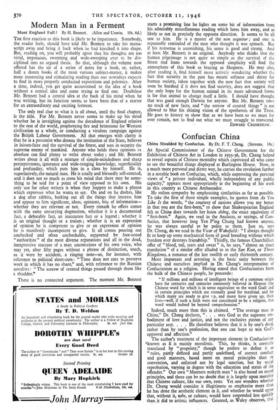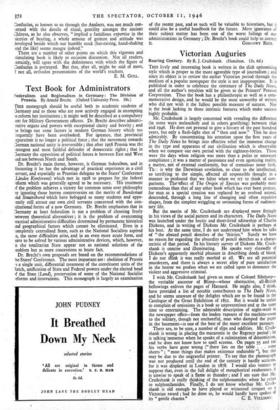Confucian China
China Moulded by Confucius. By Dr. F. T. Cheng. (Stevens. 18s.) As Special Commissioner of the Chinese Government for the Exhibition of Chinese Art in London in 1935-36, Dr. Cheng helped to reveal aspects of Chinese mentality which captivated all who came to see the beautiful things displayed at Burlington House. Now, in a much more personal and direct way, he carries the revelation further in a notable book on Confucius, which, while expressing the personal views of "a private individual, wholly independent of any public capacity," appears most appropriately at the beginning of his work in this country as Chinese Ambassador.
He enlists sympathy by emphasising similarities as far as possible. To take the first of three simple examples, he quotes from As You Like It the words, "the courtesy of nations allows you my better in that you are the first-born," to show that Shakespearian England felt as China does towards her hsien she,' the exact equivalent of "first-born." Again, we read in the Analects, or sayings, of Con- fucius, that however long Yen P'irtg Chung had known anyone, he was always careful to be polite to them. Just so, says Dr. Cheng, do we read in the Vicar of Wakefield: "I always thought fit to keep up some mechanical form of good breeding without which freedom ever destroys frienalship." Thirdly, the famous Churchillian offer of "blood, toil, tears and sweat" is, he says, "almost an exact translation" of a similar offer alluded to in the San Kuo, or Three Kingdoms, a romance of the late twelfth or early thirteenth century.
More important and arresting is the basic unity between the Chinese and ourselves implied in Dr. Cheng's interpretation of Confucianism as a religion. Having stated that Confucianists form the bulk of the Chinese people, he proceeds:
"If millions and millions of intelligent beings of a common origin
have for centuries and centuries commonly believed in Heaven (the Chinese word for which is in sense equivalent to the word God) and in certain principles which are eternally good for mankind, and for which many are ready to give rp, and many have given up, their lives—well, if such a faith were not considered to be a religion, that word would indeed be beyond comprehension."
Indeed, much more than this is claimed. "The average man in China," Dr. Cheng declares, " . . sees God as the supreme em- bodiment of love and justice, and not the exclusive patron of any particular sect. . . . He therefore believes that it is by one's deed, rather than by one's profession, that one can hope to win God's approval and affection.'
The author's treatment of the important element in Confucianism *known as Ii is mainly moralistic. This, he thinks, is correctly translated by "propriety," though he prefers to define it as "rules, partly defined and partly undefined, of correct conduct and good manners based more on moral principles than on convention, and enforced not by legal sanction but by social reprobation, varying in degree with the education Lid status of the offender." Our own "Manners makyth man" is also based on moral principles, and there can be no doubt that it is largely upon morality that Chinese culture, like our own; rests: Yet one wonders whether Dr. Cheng would consider it illegitimate to emphasise more than he has done the aesthetic element in li, and whether he would agree that, without it, wen, or culture, would have responded less quicldY than, it did to artistic influences Granted, as• Waley observes, that Confucius, as known to us through the Analects; was not much con- :erned with the details of ritual, gentility amongst the ancient Chinese, as he also observes, "implied a fastidious expertise in the aiceties of bearing, a whole armour of gesture and attitude was leveloped beside which our humble stock (hat-raising, hand-shaking and the like) seems meagre indeed." There are a number of other points on which this vigorous and ,tirnulating book is likely to occasion discussion. Not all readers, -ertainly, will agree with the definiteness with which the figure of Confucius is portrayed. But that, after all, might be said of most, f not all, orthodox presentations of the world's teachers.
E. M. Gm..































 Previous page
Previous page